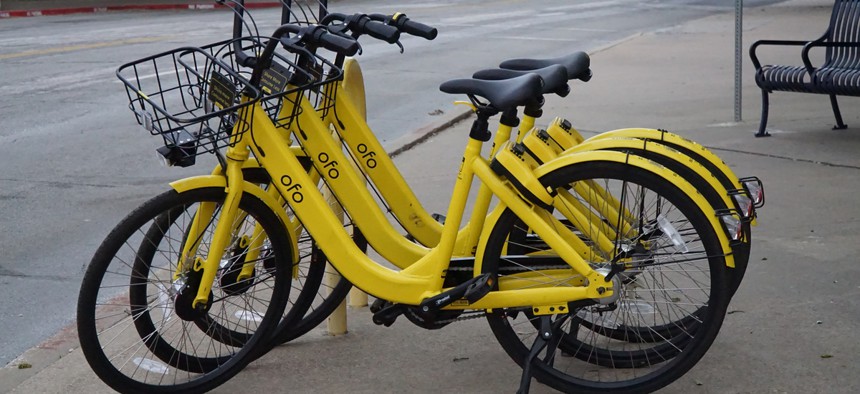Why a Dallas Ordinance Has Bike-Share Companies Worried

Ofo bikes in Dallas Shutterstock
The draft, up for discussion May 16, doesn’t mandate dockless bike sharing and includes a per-bike fee on companies to limit oversaturation.
A forthcoming ordinance in Dallas is being watched closely by bike-share companies like Zagster, who fear overregulation will negatively impact public acceptance of their service.
The city discussed regulating bike sharing in 2017, when companies started coming to town, but opted to wait and see if any problems arose.
Since then, the local regulatory landscape has heated up from Seattle to Los Angeles as more bike-share pilots take off and cities look to curb ensuing brake cutting and bike litter.
“Our staff is hoping that by having regulations in place, they will help the perception of bike sharing,” Jared White, a bicycle transportation manager for the Dallas city government, told Route Fifty by phone. “Staff is hearing there is growing discontent with these companies and how they’re operating.”
The Dallas City Council will be briefed by staff May 16 on draft ordinance, drawn up about a month ago after soliciting public comments from the six companies operating in town: Zagster, Ofo, LimeBike, Spin, Mobike and VBikes.
Zagster employs a two-point security, dockless bike-sharing system that keeps the back wheel immobilized when secured with a Bluetooth ring lock anywhere a city legally permits—a model they want Dallas to codify.
“As a company we really support smart regulations,” Tim Alborg, Zagster director of public policy and government relations, said in a phone interview. “We don’t want to overregulate the industry and not give the industry a chance to grow.”
Dallas’ draft ordinance doesn’t include a provision requiring bikes be locked to something, so as not to limit other systems. The goal is to keep regulations as general as possible, White said, though they could change over time.
There’s also been talk of capping the number of bikes per company, but instead the city will look to impose an undetermined per-bike fee to limit over-deployment.
“Once you get out of the downtown and core neighborhoods, Dallas gets pretty suburban pretty quickly, and bikes sit idle for days and months,” White said. “They’re not used in certain areas and not rebalanced as frequently as they could be.”
Zagster is behind caps on bike numbers in cities with multiple operators so they don’t overwhelm streets, as well as stricter parking regulations.
On that front, Dallas would pull in parking enforcement staff, once guidelines are in place, to spot check compliance. Last summer, the city added 3-1-1 reporting of bad actors in the bike-share space.
Zagster hasn’t seen brake cutting or bike litter in the cities they operate, Alborg said, but they are concerned about those issues, as well as accessibility for people with disabilities and equity for those without cellphones.
Dallas further bans the use of e-bikes, which bike-share companies like LimeBike also offer in other cities. That ordinance would need to be repealed, White said, a move that will be included as part of the package staff presents to City Council next month. A final vote is slated for May 23, though that could be rescheduled during the briefing.
“You’re going to really see a lot of this stuff over the next couple months,” Alborg said. “And based on the results be able to gauge the regulatory landscape.”
Dave Nyczepir is a News Editor at Government Executive’s Route Fifty and is based in Washington, D.C.
NEXT STORY: This Electric Scooter Mayhem Sounds Just Like When Cars Were First Introduced






